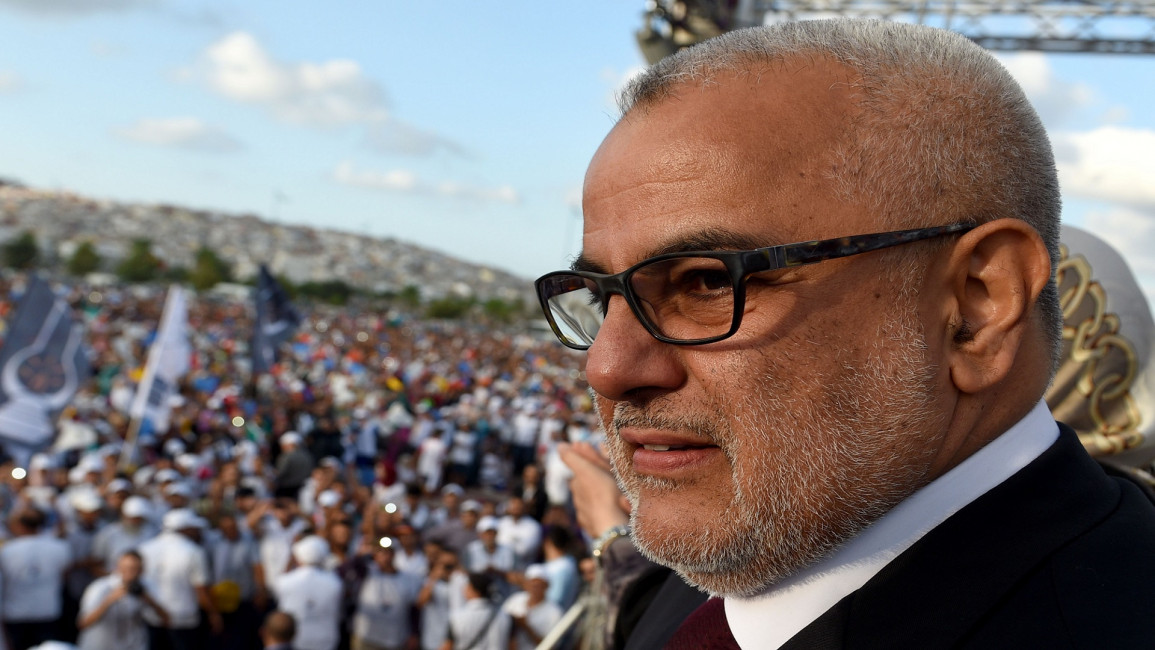'Normalisation was a mistake': Morocco's former PM denounces ties with Israel during Mayday's celebrations
Normalising ties with Israel was a "mistake", said Abdelilah Benkirane, former Moroccan prime minister and head of the Islamist party justice and development (PJD), during Mayday celebrations on Sunday morning, .
The populist leader Abdelilah Benkirane took the stage at Rabat's workers' day celebrations, in his first major public gathering after five years of "political silence."
Hanging a Keffiyeh on his neck, Benkirane devoted a significant part of his speech to the Moroccan-Israeli relations.
"We did make mistakes during our years in power. We admit it and we take it back. Yes, normalisation was a mistake," the Islamist leader addressed a crowd of hundreds of workers and reporters in his first open condemnation of the normalisation.
The Moroccan-Israeli "peace agreement" was signed under the leadership of the PJD's former leader Saadeddine El-Othmani.
At the time, the country's prime minister, Othmani met with the Israeli and US diplomats in Rabat's palace and officially announced the establishment of ties with Israel in December 2020.
But normalisation set off a series of conflicts within the Islamist party, which had swept the polls in the 2011 elections following the 20 February uprising in the Moroccan kingdom during the same year.
After a decade in power, PJD lost the majority in September 8 elections last year with only 13 seats. Some observers linked its defeat to its inconsistency on the question of relations with Israel.
Following the party's stark defeat, Benkirane was called back to the leadership of the Islamist PJD.
During his thirty-minute-long speech, Benkirane also condemned the interference of the Israeli envoy to Morocco in Moroccan politics.
David Govrin, head of the Israeli Liaison Office in Rabat, said in a recent interview with Jewish Insider that the strongest voices opposing normalisation with Tel Aviv, the Islamists, have become on the margins after the recent elections.
"I want to respond to the representative of Israel in Morocco who came out happily declaring the defeat of the PJD in the elections. (...) Why do you interfere in the Moroccan elections? (..) Do you want us to normalise and keep silent about [Israel] killing our brothers [Palestinians]," said Benkirane as the crowds cheered. He further declared that Muslims would have gone to do ‘"jihad" in Palestine if the borders were open.
The opposition leader has also called for "equal distribution of the nation's fortunes" amid the skyrocketing prices of fuel and goods under the government of Aziz Akhannouch. Many Moroccans accuse Akhannouch of benefiting personally from the fuel crisis as a billionaire and the owner of one of the biggest gas companies in the kingdom.
Despite leading PJD to sweep local, regional, and national elections for the second time in a row in the 2016's elections, Benkirane left the political scene after he failed to reach a governmental alliance with other parties.
His failure was mainly due to his disaccord with Aziz Akhannouch, head of the National Rally of independence (RNI) and current Moroccan PM, over the political parties that could participate in the alliance.
To end the stalemate, King Mohammed VI removed Benkirane and appointed Saadeddine El-Othmani, another PJD member as prime minister.
During El Othmani's era, which was marked by political instability, economic decline, and a crackdown on dissent, Benkirane disappeared from the political scene, limiting his communication to pictures of handwritten notes he shared on his Facebook pages to announce major positions.
The comeback of Benkirane, the palace outsider and the "anti-rich figure", as an opposition leader against his old rival, tycoon PM Akhannouch, has already escalated tensions within the Moroccan political scene.
Benkirane has publicly accused Akhannouch's party of using "money and power" to influence the results of the September 8 elections.



